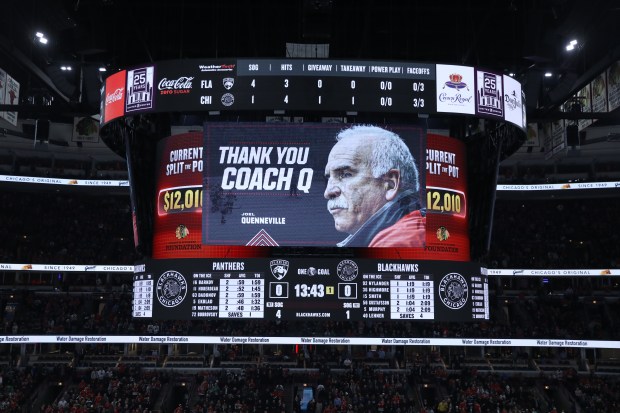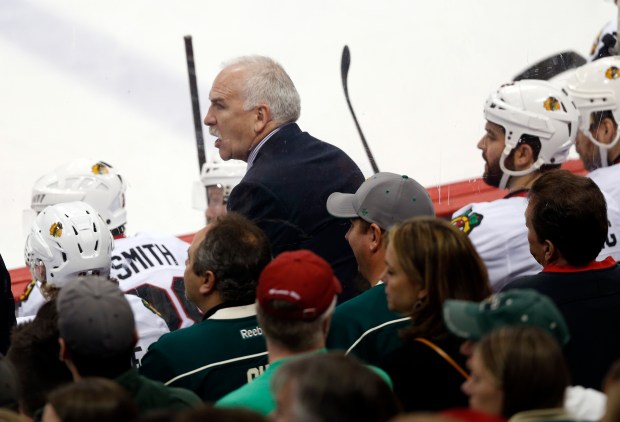Former Chicago Blackhawks coach Joel Quenneville has sat down for at least two interviews this year, and the first subject he tackled in each wasn’t Kyle Beach, but instead pickleball.
“Playing a lot of pickleball down in Florida, pickleball heaven right around Naples,” he told The Leafs Nation in February.
Earlier this week, Andy Strickland of “The Cam & Strick Podcast” asked Quenneville what he has been doing the last couple of years.
“I’ve been living down in Florida, been playing a lot of pickleball,” he said. “It seems like it’s a craze that’s gone over the top and I’m in the middle of it all, enjoying it every day.”
Based on the rest of the interview, he has gotten really good at dodgeball too.
That’s what he did for the rest of the nearly 45-minute “Cam and Strick” interview: duck and dodge questions and contradict himself about what he knew — and when — about Beach’s sexual harassment allegations against former Hawks video coach Bradley Aldrich.
For those who may need a refresher — perhaps Quenneville himself — Beach, a former Hawks prospect, accused the Hawks of negligence in a May 2021 lawsuit. Identifying Beach only as “John Doe,” the suit accused Aldrich of “forcibly touching” him and using threats of physical violence and harm to his hockey career in an effort to coerce Beach into having sex with him in May 2010.
That prompted the Hawks to hire law firm Jenner & Block to conduct an independent investigation. In October 2021, the firm’s report found that team executives were told about Beach’s allegations when he first came forward in 2010 and that they “violated” the team’s sexual harassment policy by not investigating the allegations “promptly.”
According to the Jenner & Block report, then-Hawks President John McDonough reported Aldrich’s alleged misconduct to human resources — three weeks after team executives met about Aldrich and and five days after the Hawks won their first Stanley Cup in 49 years.
On June 16, 2010, Aldrich was given the option to resign and “received a severance and a playoff bonus, and continued to be paid a salary for several months,” according to the Jenner & Block report. He participated in the victory parade, had his name engraved on the Stanley Cup and got to take it to his hometown of Houghton, Mich.
In 2012, Aldrich took on a role as a volunteer assistant hockey coach at Houghton High School, and he was arrested in October 2013 in a case involving a 16-year-old player. Aldrich pleaded guilty to misdemeanor criminal sexual conduct in December 2013 and was sentenced to nine months in jail. After his release in July 2014, he was required to serve five years of probation and register as a sex offender.
Many of these details came to light in two lawsuits against the Hawks filed in May 2021, the one by Beach and the other by the former Houghton High School player. Other details were revealed in subsequent reporting after Beach’s lawsuit became an international story.
But based on his podcast interview, Quenneville was mostly oblivious to it all at the time.
When asked whether he was “forced” to resign as Florida Panthers coach on Oct. 29, 2021 — two days after then-Hawks general manager and president of hockey operations Stan Bowman “stepped aside” with the release of the Jenner & Block findings — Quenneville said, “It all happened so fast.”
“To be quite honest, I didn’t think I was going to miss one game,” he told Strickland. “That was the first day after I coached the last game. I was on the plane going to see (NHL Commissioner) Gary (Bettman) … (and) on the way there, that was the first day I read the report.
“I think it was the summer of ’21 where I heard anything about sexual abuse or assault, and the day before that last day I coached, Kyle came out (in a televised interview) and said that he had been assaulted. … Where I read the details was on the plane up to New York that day. And I’m sitting there reading it … and it was the first time I heard anything about it and it made me sick to my stomach when I read how our video coach (allegedly) assaulted one of the players.
“Leaving Mr. Bettman’s office that day, we came to an understanding that it would be best for me to step away, and I didn’t anticipate I would be gone this long.”
It has been more than three years in exile. Perhaps Quenneville plans to use this interview as a launching pad for a contrition tour in a bid to get back into the NHL as a coach.
But if you’re trying to show contrition, you can’t dance around the facts.
So we’re to believe that Quenneville was mostly in the dark about the ugly details of Beach’s allegations until he was on the plane to New York in October to receive his reckoning in person from Bettman?
It just doesn’t track.
A team you coached to a Stanley Cup championship becomes embroiled in the biggest scandal in its history and is named in two lawsuits, and you were too bogged down with your job to take a peek?
Granted, Quenneville said he heard something about sexual assault (“I think it was the summer of ’21”) but he didn’t say how. When asked specifically by Strickland how he found out that Beach — as “John Doe” at the time — had sued the Hawks, Quenneville said: “I don’t know how ”] (I) found out. I don’t know. Might have read it or somebody might have called me. Blackhawks might have called me.”
Mind you, it’s also on the record in the Jenner & Block report that Quenneville submitted to two interviews with the firm’s investigators, on July 20, 2021, and Sept. 27, 2021.
A source familiar with the Jenner & Block investigation told the Tribune that Quenneville told investigators “he had read the John Doe complaint,” referring to Beach’s lawsuit.
During a series of questions, Quenneville was asked whether he was aware a sexual assault had allegedly occurred, according to the source, who added that the former Hawks coach had an attorney present for both interviews, which were conducted via Zoom.
There’s also the matter of what Quenneville was told during a May 2010 meeting about Aldrich’s alleged misconduct in McDonough’s office. Quenneville said he was summoned while the meeting already was in progress.
“They asked me did I know about a video coach hanging around the Rockford players,” he told Strickland. “I didn’t know anything about it. And they told me he was hanging around the Rockford players.”
Beach and another former Hawk who leveled allegations against Aldrich (and who has a separate negligence lawsuit pending against the team) played for the “Black Aces,” a squad of prospects that traveled with the team during the playoffs in case of injuries.
Quenneville said he was told that Aldrich “was socializing, they were going out to bars, and he might have sent an inappropriate text or two and that he was bugging (Beach). And that’s all I know.
“I didn’t put it all together that it resembled sexual abuse or sexual assault. By not asking more questions — and I take ownership on that — that had I known more, I would have handled it completely different.”
Nothing in the independent report disputes Quenneville’s assertions he didn’t know more, but “an inappropriate text or two” should have been enough to raise red flags.
Quenneville said McDonough had a strict structure for the coaching staff and Hawks management, which Quenneville nicknamed “The Firm.”

“I knew what my job was, and that was to stay in my own lane and do my job as a coach,” Quenneville said. “I think what I heard in that meeting didn’t qualify.”
“Didn’t qualify” sounds like a cop-out. Have a conversation with Aldrich at the least. Playoffs or not. “The Firm” or not. He was one of your subordinates.
Brent Sopel, a Hawks defenseman at the time, previously told the Tribune about Aldrich’s alleged behavior: “Did every person know about it? Absolutely. Every person. Every coach. Everybody knew about it.”
Other witnesses, including players, contradicted Sopel when questioned by Jenner & Block investigators.
Sopel said Wednesday through a representative that he stands by his claim that everyone knew and by all previous statements he made. He declined to respond to Quenneville’s comments.
Sopel and Nick Boynton were the players who brought the allegations by Beach and the other player about Aldrich to skating coach Paul Vincent. Vincent brought the matter to mental skills coach James Gary, who later brought it to management.
Vincent said he couldn’t recall any time he discussed Aldrich’s alleged misconduct with Quenneville, to whom he reported, either during the 2010 playoffs or later.
“Not really because I believed that the team psychologist (Gary) was going to handle it appropriately,” he told the Tribune. But in his estimation, Gary and team executives didn’t when they didn’t report Beach’s allegations to Chicago Police.
“The police would have had to intervene, interview people.”
Vincent said he shared his concerns in a separate meeting with management in May 2010, though several witnesses have disputed that.
“I know in my heart that I told the truth,” he said. “And it was buried.”
Asked for his reaction to Quenneville’s podcast interview, Vincent said: “He doesn’t want to remember or doesn’t want to say: ‘Yeah, that’s what happened. I take full blame for not pursuing anything.’ Instead he just kind of runs in a maze.
“You have an obligation as a coach to be honest, to be forthright and to protect your players.”
Still, Vincent admits he has mixed feelings about Quenneville, whom he respects as a three-time Stanley Cup-winning coach.
“I thought we got along immensely,” he said. “I thought we were, I guess, friends. And that’s why I keep saying it’s a shame in this era that people can’t be honest and forthright and say what happened to Kyle.”
Vincent believes Quenneville should be allowed to coach again.
“I think everybody deserves a second chance,” he said.
Quenneville said during the interview that he has had several inquiries from teams, though he needs clearance from Bettman before anyone can hire him. But he’s had discussions with Bettman in recent months.
“I’ve been more than patient,” Quenneville said. “What’s the next move?”



